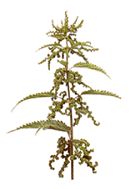
Stinging Nettle
Introduction
This fact sheet provides basic information about Stinging Nettle. The nettle plant can found naturally in most temperate regions of the world. The tough fibers from the nettle stem have been used to make cloth and cooked nettle leaves have been consumed as a vegetable. Historically, nettle has been used to relieve coughs, tuberculosis, arthritis, and to stimulate hair growth.Common Names
Stinging Nettle, White Nettle, Hemp Nettle, Common Nettle, Greater Nettle, Stinging Nettle, Devil's LeafLatin Names
Urtica dioicaWhat It Is Used For
- Hay fever symptoms, including sneezing and itching; urinary tract infections; kidney stones; and to increase urination.
- It also claims use as a remedy for premenstrual bloating and excessive menstrual bleeding.
- Nettle use is claimed to help relieve the early symptoms of benign prostatic hypertrophy (BPH).
How It Is Used
Historically, nettle has been applied topically to relieve pain associated with arthritis. While applying this stinging nettle to the skin has not been proven therapeutically effective, it is considered safe, yet a bit painful.Stinging Nettle has a flavour similar to spinach when cooked, and is rich in vitamins A, C, D, iron, potassium, manganese, and calcium. Soaking nettles in water will remove the stinging chemicals from the plant, which allows them to be handled and eaten without incidence of stinging.
What the Science Says
- There is still some disagreement as to the identity of the active constituents in the nettle herb. While many researchers believe that polysaccharides and lectins are most likely to be the main constituents, it is still unclear.
Side Effects and Cautions
- Nettle has not been evaluated by the FDA for safety, effectiveness, or purity.
Sources
- Drugs.Com Web site. Accessed on February 7, 2009.
- From Wikipedia, the free encyclopedia. Accessed on February 7, 2009.






